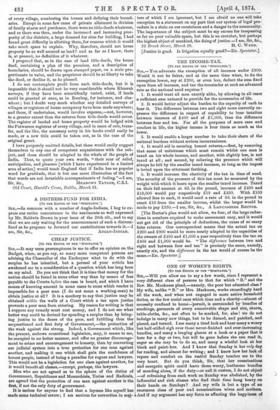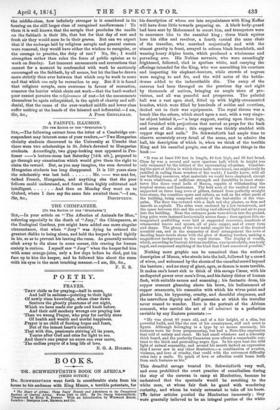ONE OF WOMEN'S RIGHTS.
(TO THE EDITOR OF THE "SPECTATOR.")
Sre,—Will you allow me to say a few words, since I represent a very different class of persons to that for which "B." and the Rev. Mr. Meekness plead,—namely, the poor but educated class ? My wife, unlike "B." or Mrs. Meekness, works exceedingly hard all the week, and when not engaged in more active household duties, or the few social ones which time and a charity—almost of necessity confined to home—permit, is surrounded by bundles of stockings, garments of every conceivable shape and size, sheets, table-cloths, &c., not often to be marked, for, alas ! we do not indulge in many new things, but to be darned, and patched, and pieced, and turned. I see many a tired look and hear many a weary but half-stifled sigh over these never-finished and ever-increasing bundles, and many a longing glance at a book or a paper that is here for a day or two, but will be gone before she can read it, eager as she may be to do so, and many a wistful look at her block and paint-box. And I know that Sunday is her only day for reading, and almost for writing ; and I know how her look of repose and comfort on the restful Sunday touches me to the very heart. But do you think, Sir, that her conscientious and energetic spirit could leave those weary, loathsome bundles of mending alone, if the duty—or call it custom, I do not object —of refraining from such work on Sunday was abolished, by the influential and rich classes who find their time hang heavy on their hands on Sundays? And my wife is but a type of an enormous class of poor and conscientious wives and mothers. e And if my argument has any force as affecting the happiness of
the middle-class, bow infinitely stronger is it considered in its bearing on the still larger class of recognised needlewomen To them it is well known that the scruple that precludes the needle on the Sabbath is their life, that but for that day of rest and fresh air they would soon be in their graves. But can we expect that if the embargo laid by religious scruple and general custom were removed, they would have either the wisdom to recognise, or the courage to practise, the duty of rest ? No, Sir ; I would strengthen rather than relax the force of public opinion as to work on Sunday. Let innocent amusements and recreations that cannot for a moment be confounded with work be cautiously encouraged on the Sabbath, by all means, but let the line be drawn more strictly than ever between that which may be work to some and that which can only be recreation to any. But if it is found that religious scruple, once overcome in favour of recreation, removes the barrier which shuts out work—that the hard-worked poor cannot perceive the religiousness of rest—let the amusements themselves be again relinquished, in the spirit of charity and self- denial, that the cause of the over-worked middle and lower class suffer nothing at the hands of the leisured and influential.—I am,



































 Previous page
Previous page